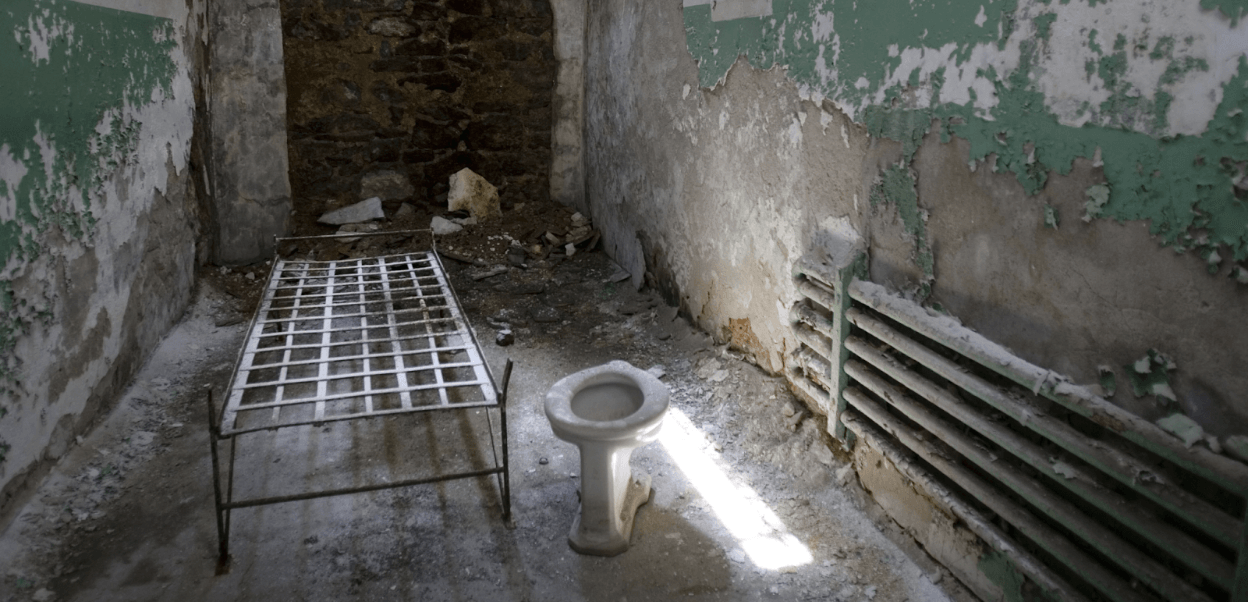End the Mass and Inhumane Mistreatment of Prisoners
Tragically, solitary confinement is being used as prisons’ primary response to COVID-19.

A solitary confinement cell located in Philadelphia – Credit: Matt Rourke AP
As Tammie Gregg, the Director of the American Civil Liberties Union’s Stop Solitary Campaign, so astutely put it, “medical and mental health experts, impacted people, and advocates agree that solitary confinement — like that which ultimately resulted in the deaths of [inmates] Layleen Polanco and Kalief Browder — is torture.” Still, it's well documented that this country's federal and state prisons have abused the practice for decades. Its “debilitating, dehumanizing, and even deadly effects on incarcerated people” represent what Gregg characterizes as “an ongoing stain on the American legal system.”
Tragically, the use of solitary confinement has become even more frequent following the COVID-19 pandemic. Alarmingly, throwing prisoners into “the hole” has become a routine way correctional authorities across the nation have begun dealing with prisoners suspected of having contracted COVID-19 and other illnesses.
During their 2020 campaigns, President Joe Biden and Vice President Kamala Harris both committed to ending the use of solitary confinement in America’s prisons. To date, they
have failed to deliver on that promise, and there is little indication that they have immediate plans to do so. According to the
ACLU, this time last year, more than 10,000 people — representing nearly 8 percent of the total federal prison population — were in some form of solitary confinement on any given day. This percentage is substantially higher than the national average in state prison systems and even higher than in the federal BOP just a decade ago before reductions were made under the Obama Administration.
A currently-incarcerated LPP constituent’s wife shared her experience with the BOP and their response to her husband testing positive for COVID. The non-violent cannabis-prisoner’s name has been redacted, out of an abundance of caution, for fear of reprisal against him.
“I haven’t heard from [REDACTED] in a week because he ended up testing positive for covid which you get thrown in the hole for. What [REDACTED] just described to me is completely inhumane. He told me that the medical CO mentioned that it was a waste of his time helping [REDACTED] and that the only thing that they can do to help is give him Tylenol and water WHICH they didn’t even give to him for 2 days in the hole. He said that he could not breathe at all and wasn’t able to drink water because his throat was so swollen he couldn’t swallow! With that being said- they put him in a small room with the heat turned all the way up and the windows closed. He told me he had to beg them for their help when his breathing became so bad and they took their time helping him. I am infuriated!!! What if his immune system wasn’t strong enough to get him through?! They treated him as if he wasn’t worthy of any help!!”
However, this mass mistreatment of inmates, as a misguided and inhumane response to COVID, isn’t unique to federal prisons. In recent weeks, KUOW reported that the Stafford Creek Corrections Center in Aberdeen, Washington has forced prisoners to make a choice — go to “the hole” or sign a waiver agreeing not to hold the prison and its employees liable if the inmate contracts COVID while in their custody.
While President Biden acknowledged that mass incarceration “imposes significant costs and hardships on our society and communities and does not make us safer,” and promised to “decrease incarceration levels” by reducing “profit-based incentives to incarcerate” in
Executive Order 14006 issued early last year, that promise remains empty and unfulfilled.
Please visit LPP’s Take Action page to find out how you can join in our fight to free every last cannabis prisoner.






